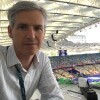War in Ukraine will make it hard for UEFA to keep political messages out of stadiums at Euro 2024
War in Ukraine will make it hard for UEFA to keep political messages out of stadiums at Euro 2024
FRANKFURT, Germany (AP) — There are UEFA rules against making political statements in stadiums at soccer’s European Championship.
But they may be harder than ever to police at a tournament that is among Europe’s strongest shared cultural experiences. Euro 2024 in Germany is being played over the next month when unity is fragile across the continent.
Ukraine is competing against the backdrop of the war at home against Russia, and its fans already used qualifying games to make their point by displaying politically charged banners in the stands.
More of the same can be expected in Germany and could test the spirit and limits of UEFA’s disciplinary code.
Ukraine was fined by UEFA following both of its two qualifying playoff wins in March. The national soccer federation paid 15,000 euros ($16,000) each time after fans aimed an expletive at Russian President Vladimir Putin and held up banners about the Azov Brigade unit of Ukrainian soldiers which has roots in far-right nationalism.
However, UEFA did not open a disciplinary case relating to other banners that called Russia “a terrorist state” and criticized the United Nations. That message compared the current situation in Ukraine to Srebrenica in 1995, the site of a massacre of Bosnian Muslims by Bosnian Serbs during war in the former Yugoslavia.
That highlights the difficult balance in deciding what a country at war should be allowed to say at a sports event. And UEFA, itself, cannot avoid playing politics in soccer, having banned Russian teams from international competitions since February 2022 and separated teams from neighboring Armenia and Azerbaijan in its competition draws for 17 years now.
“UEFA is fining Ukraine after every game at the moment because of Azov symbols,” Ronan Evain, of the UEFA-recognized Football Supporters Europe group, said in a recent interview. “It is a bit of a gray area. Some things can be perfectly fine and allowed at home and then not abroad.”
With a massive global audience tuning in to each game at Euro 2024, any statement banners in the stands will draw even more attention — as will any sanctions from UEFA.
The challenge is made even greater at a tournament where the 24 competing nations and their fans reflect a wide range of political views, said Piara Powar, executive director of the Fare network, a long-term partner of UEFA and FIFA that monitors extremism in stadiums.
The governments of Euro 2024 teams Hungary, Serbia and Slovakia have broader sympathies with Russia. The central location of Germany makes it easy for fans from around Europe to attend games.
“We know that the accessibility of Germany is an issue,” Powar said in an interview. “It’s very convenient for anyone to jump in a bus or car and get here.”
Fare places monitors in stadiums who are expert in understanding the language and context of chants, banners and symbols.
One potential issue is flags with maps of a country that signal nationalism by including disputed territory and borders not recognized in international law.
Powar pointed to a case FIFA prosecuted at the 2022 World Cup involving Serbia players. They displayed a flag in their locker room in Qatar which included the independent state of neighboring Kosovo, and a slogan “No Surrender.”
At the last Euros, the Russian soccer federation formally complained to UEFA about Ukraine’s team jersey. It was patterned with a national outline that included Crimea, which Russia illegally annexed in 2014. UEFA let Ukraine keep the design.
Even official national flags could be a security issue at stadiums and fan zones, though likely not a UEFA disciplinary case. Israel is a UEFA member country but German authorities said only flags of the participating teams should be displayed.
In Qatar two years ago, rainbow symbols were judged a provocation by the host country which has laws against same-sex relationships. A similar issue could arise when Saudi Arabia hosts the 2034 World Cup.
German soccer has long-standing support for LGBTQ rights, and Euro 2024 organizers have stressed the tournament should celebrate “life, inclusion, and diversity.”
“We will see a lot (of rainbow flags) from German fans, it should be treated as business as usual,” Evain said. “The acceptance of what is freedom in speech in Germany is pretty broad.”
UEFA’s jurisdiction at the tournament can also stretch beyond the usual stadium perimeters where federations are responsible for fans’ conduct.
After Russians attacked England fans in the French port city Marseille at Euro 2016, UEFA’s executive committee warned both soccer federations their team could be disqualified. The UEFA disciplinary panel fined Russia 150,000 euros ($160,000).
UEFA said its disciplinary investigators and judges in Germany aim to deal with cases within days before a team’s next game.
Financial penalties are typical for a first offense — 10,000 euros ($10,700) for a political banner or disturbances during a national anthem. Only in extreme cases or multiple repeat offenses, even for charges of racist behavior, would UEFA escalate to a points deduction.
An infamous disciplinary case in Euros history was a 100,000 euro ($107,000) fine for Denmark forward Nicklas Bendtner in 2012 for celebrating a goal by showing his branded underwear. That sum directly related to his payment for the ambush marketing stunt.
UEFA also has a tariff of fines for each lit smoke flare and firework which have proved difficult to stop fans getting into stadiums.
The current political situation could make Euro 2024 a more challenging event than the 2006 World Cup that was also hosted in Germany, though they share some positives.
“We know the German police are very sophisticated,” Powar said, “and a good number of German ultras are very progressive.”
___
AP Euro 2024: https://apnews.com/hub/euro-2024


